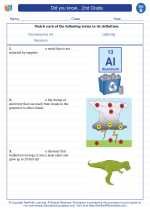Nitrification
Nitrification is the biological process by which ammonia (NH3) is converted to nitrite (NO2-) and then to nitrate (NO3-) by the action of nitrifying bacteria. This process plays a crucial role in the nitrogen cycle, as it converts ammonia, which is toxic to many organisms, into forms that can be readily used by plants.
Key Concepts
- Nitrification is a two-step process involving the conversion of ammonia to nitrite and then to nitrate.
- Nitrifying bacteria, such as Nitrosomonas and Nitrobacter, are responsible for carrying out the nitrification process.
- Nitrification occurs in aerobic (oxygen-rich) environments, such as soil and aquatic systems.
- Nitrate, the end product of nitrification, is an important source of nitrogen for plant growth.
Study Guide
Here are some key points to remember when studying nitrification:
- Define nitrification and explain its significance in the nitrogen cycle.
- List the two main steps of the nitrification process and the specific bacteria responsible for each step.
- Explain the environmental conditions required for nitrification to occur.
- Discuss the role of nitrates in plant nutrition and growth.
- Describe the potential environmental impacts of excessive nitrates in water systems.
Understanding nitrification is important for grasping the interconnectedness of biological and chemical processes in ecosystems, as well as for understanding the importance of nitrogen as a nutrient for plant growth.
[Nitrification] Related Worksheets and Study Guides:
.◂Science Worksheets and Study Guides Second Grade. Did you know... 2nd Grade
Study Guide Did you know... 2nd Grade
Did you know... 2nd Grade  Worksheet/Answer key
Worksheet/Answer key Did you know... 2nd Grade
Did you know... 2nd Grade  Worksheet/Answer key
Worksheet/Answer key Did you know... 2nd Grade
Did you know... 2nd Grade  Worksheet/Answer key
Worksheet/Answer key Did you know... 2nd Grade
Did you know... 2nd Grade  Vocabulary/Answer key
Vocabulary/Answer key Did you know... 2nd Grade
Did you know... 2nd Grade 

 Worksheet/Answer key
Worksheet/Answer key
 Worksheet/Answer key
Worksheet/Answer key
 Worksheet/Answer key
Worksheet/Answer key
 Vocabulary/Answer key
Vocabulary/Answer key

The resources above cover the following skills:
Earth Systems Science
Weather and the changing seasons impact the environment and organisms such as humans, plants, and other animals. Students can:
Analyze ways in which severe weather contributes to catastrophic events such as floods and forest fires